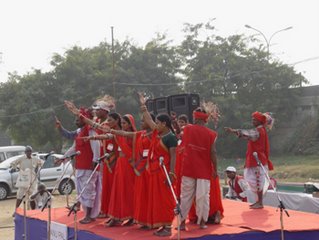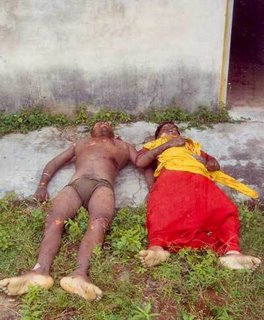As farmers in the Vidarbha region of Maharashtra continue to be driven to suicide, it is the sarkari babus who are really benefitting from the relief package announced by the Prime Minister Manmohan Singh. A report from Ground Zero. Even
Gandhigiri has failed miserably in the
Vidarbha region of Maharashtra. As a group of farmers in Vidarbha’s Yavatmal district washes the feet of a bank manager – to coax him into granting more loans – 45-year-old Kowdu Ukunda Parchake is being laid into his grave, in village Daaba. A tribal farmer, Parchake ended his life by consuming pesticide when his other family members were not at home; a pesticide that ironically cost him 3,000 rupees a litre. Villagers have assembled outside their mud settlement, where Parchake’s widow Savitri sits silently, her tears making two dirty arrays over her cheeks, down to her neck.
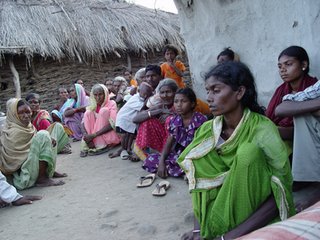
Parchake’s story has elements very similar to 111 other farmers of the region, who decided to end their lives in October. And to 1,101 of those who chose to bid a silent farewell to this world since June, 2005. Parchake was a loan defaulter, for 11,400 rupees that he had secured from a bank, and he had further borrowed an unknown amount of money from a private money-lender. He was under pressure to get his daughter, who had attained the age of eighteen, married. The cotton crop he had sown on his 3-acre land had failed, and as the Minimum Support Price of cotton fixed by the government dwindled to 1,750 rupees a quintal last year, he had lost all hope.
It is easy to blame multinationals or foreign powers for the suffering of Vidarbha, but one visit across the region makes it clear that the suicides by farmers are a result of the mess created by the government. The policies introduced by the government, activists working in this region allege, are inspired by economists and agricultural experts who never venture out of their air-conditioned environs. The cotton crop is about to be sold in the market, and the administration is now distributing pesticides to the farmers. A litre of pesticide that costs the government 1,700 rupees is sold off by most of these farmers for 200 rupees. During times when there is not even food to be offered to children, even 200 rupees mean a lot.
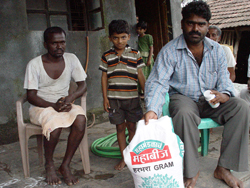
“Look at this,” Munna Bolenvar of village Hevyura points at a sack of gram seeds, “The government offered it to us, claiming that they were providing it to us at a 50 percent subsidized rate of 18 rupees a kilo. We went to the market and found that the same seeds, from the Mahabeej company, are available at 18 rupees a kilo. My brother-in-law lives in Andhra Pradesh, and I procured seeds from the same company, at 10 rupees a kilo from there.”
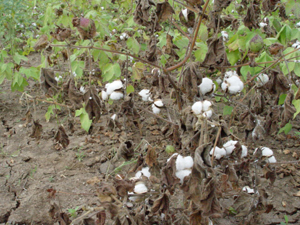
Everywhere in the region, the
BT cotton has been affected with the deadly Lalya disease, which hits the crop so fast that by the time the farmer realizes it, the crop is reduced to shreds.
“The government beat drums about the quality of BT cotton. Right from the Union Agricultural Minister, Sharad Pawar, the government swore that this new variety would change our lives. They even roped that Marathi film actor, Nana Patekar, to trap us. Look how they have changed our lives,” says 70-year-old Nagarao.
“The non-BT cotton variety would bear flowers at least twice a season. But this BT cotton has ruined our lives. The moment the disease strikes the crop, we are forced to buy costly pesticides which can cost 10,000 rupees a litre and still the crop will not give the desired yield,” rues another farmer.
The Prime Minister’s rehabilitation packages, meant for the six worst-affected districts of the region, hardly reach any farmers. The packages are for the Yavatmal, Akola, Amravati, Buldhana, Wardha and Washim districts. They are meant to offer waivers of interest worth 712 crore rupees on bank loans, and extension of the period for repayment by three to five years for loans of 1,296 crore rupees.
A new breed of middlemen have come into being, since the Prime Minister declared the 3,750-crore packages. Thakur Sangrachaure, a farmer from village Kolezari, had borrowed an amount of 20,000 rupees from a bank. After the PM’s visit, a middleman arranged to pay his loan back to enable him to receive a fresh loan. After the middleman paid the amount to the bank, Sangrachaure received a new loan of 25,000 rupees. From this amount, the middleman deducted his original 20,000 rupees plus 2,000 rupees commission. Finally, Sangrachaure was left with a mere 3,000 rupees and moreover, he now owned 25,000 rupees to the bank. “This is happening in connivance with the bank officials. The manager has a share in the commission,” allege farmers. There is no way a farmer can put such little money to use to rescue his crop.
“So he ends up purchasing an item like television since it is a matter of prestige among villagers,” says Bhimrao, an activist.
“Is this the package they are talking about?” a farmer tells us, as he shows us a water pump. The pump, bearing the name of Vijay Motor Pump, was offered to farmers under one of the PM’s packages. For a period of three years, the government would offer farmers pesticides and other agricultural equipment worth 25,000 rupees. For this pump, a farmer was made to pay 4,500 rupees; the government claimed that it would pay the rest of 10,000 rupees directly to the company. “But we found that the same pump was available in the market at a price of 6,000 rupees. So who is cheating us? The government itself,” says Bolenvar.
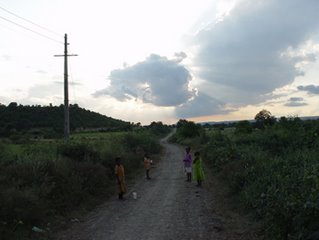
Singh also proposed measures like horticulture and fishery, to diversify farmers’ income. The farmers collective of village Hevyura submitted a proposal for diary farming to the District Collector more than two months back. But they have yet to hear from him.
The Prime Minister also sanctioned 2,177 crore rupees for 523 irrigation projects; most are on hold, due to financial and management constraints. Out of 60 crore rupees meant to be spent on building 3,000 check dams this year, the state government has released only 7 crore rupees so far. Vidarbha has poor irrigation facilities; moreover, water charges in Maharashtra are the highest in the country.
In Vidarbha, farmers do not have easy access to cooperative and bank loans. Institutional loans disbursed to farmers in Vidarbha are as low as 8 per cent of the total of all loans, compared to 80 per cent in western Maharashtra . “It is a vicious circle,” says journalist Jaideeep Hardikar, “When farmers don’t get loans from the banks, they approach the money-lender, who charges interest rates as high as 200 percent per annum.” Two-thirds of Vidarbha’s farmers are loan defaulters. “It is almost 100 percent,” claims an activist.
Farmers across Vidarbha say that they cannot do away with money-lenders. “Suppose I fall ill and need money immediately. Do you think I will get an instant loan from the bank? The bank will never give me money. The sahukar (money-lender) will,” says a farmer. The banks may not have money for farming or health emergencies, but they surely have two-wheeler loans. Activists say they are aware of cases where a bank has personally delivered motorcycles to farmers who did not even known how to ride a cycle. As a result, it is a common sight across Vidarbha, to see motorcycles parked outsides homes who may not have even have a morsel of food.
Have the farmers ever thought of growing food crops instead of cotton? “Yes, we have,” says Dev Raj Sheda from Karanji village of Pandharkawada Tehsil, “We have grown jowar. But just a month ago, jowar was 800 rupees a quintal. Now it is less than 400 rupees a quintal.”
So, is offering packages a solution? No, say farmers in unison. “Just give us a correct price for our cotton. If not 3,000 rupees, give us at least 2,500 rupees a quintal,” says Paras Ram of Saikar village.
“There is nobody as miserable in India as Vidarbha farmers,” declares Kishore Tiwari of Vidarbha Jan Andolan Samiti, “In America, the cotton farmers get a subsidy of 14,000 crore rupees. The Indian ‘Shehanshahs’ (Kings) are acting on behalf of the supreme Shehanshah of the world, George Bush.”
Besides better crops and pricing, another important step to stop suicides would be to bring private money-lenders under some sort of regulation. “If one Harshad Mehta would result in SEBI, then why are so many deaths not waking up the Government from its slumber,” asks Tiwari.
While the farmers are battling weather and debt, the illness chikungunya is spreading its tentacles. In the absence of government medical facilities, almost 80 percent of those who suffered from the disease went to private doctors. As a result, the farmers fell further into the debt trap. The nearest health centre from village Hevyura is 10 kilometres away. “I took a relative of mine, suffering from chikungunya, to the government rungnalaya (health centre) in Pandharkawada, but instead of treating him immediately, the doctor was taking a stroll outside, while listening to music on a Walkman. When after repeated requests he did not budge, I beat him up,” says Munna Bolenvar.
The most disturbing aspect in the region is that tribal farmers have been increasingly committing suicide, for the past two years. “Until two years ago, a tribal suicide was unheard of. No matter what happens, a tribal resident will stick to his land. But now, even they are ending their lives,” says Hardikar.
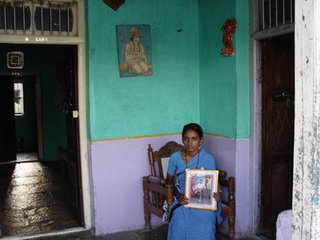
If Chandrakant Baprao Ji Mule had shouted from his home in, say Delhi or Mumbai, on April 1, people would have thought that he was trying to play a prank with them on April Fool’s Day. But that afternoon, when Mule’s wife, Rekha and his brother, Prahlad heard that cry, their hearts sank immediately. Even before they could react, Mule, a farmer from Saikar village, appeared from his room, engulfed in flames. His brother tried to douse the flames with a bucket of water, but it was too late.
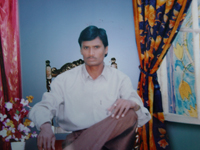
Mule had suffered almost 100 percent burns. The same night, he died in the hospital, leaving behind two children. “He never talked about the fact that he owed one lakh rupees to the bank and an unknown amount to the money-lender. He was an owner of 15 acres of land and had suffered heavy losses for the past two years,” says his brother.
Nobody can identify a farmer who is about to commit a suicide. Almost every farmer has the potential of committing suicide. Prem Das is the owner of 22 acres of land. He spent 1.5 lakh rupees on a harvest of cotton and is hopeful of gaining a profit of 1 lakh rupees. But he owes 3 lakh rupees to a money-lender, for which he has to pay an interest of 1.5 lakh rupees. “I better not think about it, otherwise I will also have to drink Spintor (a pesticide),” he says, as he manages to give a faint smile.
“Why do you drink so much alcohol?” a woman from an NGO recently asked a farmer in Wardha district.
“Because I don’t have the courage to consume pesticide, madam,” he is reported to have replied bluntly.
The government had also roped in members of the Art of Living in few districts to teach farmers how to meditate. “Have they never heard of this: Bhookhe paet na hoye bhajan Gopala (prayers cannot be said over empty stomachs)?” wonders a farmer from Amravati district.
Girls in the region have now become wary of getting married to men who are farmers. “I have seen the condition in my own house since my father is a farmer. I don’t want to marry a farmer and turn into a widow in few months,” whispers a girl.
Meanwhile, foreign journalists are flocking to the area, hoping to report the ‘true image’ of a ‘developing country’ that boasts being a nuclear power. A French journalist asks a farmer’s widow: When was the last time you had meals with your husband in a three-star or a five-star hotel? The poor woman looks at the blonde lady, until the journalist’s Indian resource person drags her away.
Sources say they have seen a few men in the region who talk about ‘dying and killing for a cause’. This is confirmed by a farmer in Pandharkawada, who says that he has seen ‘Annas’ (elder brothers, as men from the neighbouring state of Andhra Pradesh are referred to) talking to villagers. Not very far away from the scene, a farmer picks up from his field a few red leaves of the cotton crop, affected by Lalya (the red disease). “The red colour is ruining our lives, but in the end, we might have to join the Red like our brothers in Andhra Pradesh,” he mutters thoughtfully. He is referring to the Naxalites. Had the government heard this, would it have been worried? Looking at the way the government is handling the Naxalite problem, it seems unlikely.
(This report appeared as a part of the cover story of
The Sunday Indian)
 The number of farmers committing suicide in Vidarbha since June 2005 has risen upto 1,136. In November alone, this year, 91 farmers have committed suicide.
The number of farmers committing suicide in Vidarbha since June 2005 has risen upto 1,136. In November alone, this year, 91 farmers have committed suicide.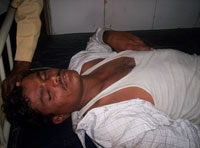 I don't know how to continue living. I have taken a loan of 15,000 rupees. The Government says that the price of cotton will not be hiked. Since I have plunged into losses, I am ending my life. My mother and father should not be harrassed. Chief Minister, please give us the correct price for our cotton. Deputy CM, RR Patil, fix the rate at 3,000 rupees otherwise more suicides will happpen. Pratibha, please get remarried; I am sorry, I am leaving you alone.
I don't know how to continue living. I have taken a loan of 15,000 rupees. The Government says that the price of cotton will not be hiked. Since I have plunged into losses, I am ending my life. My mother and father should not be harrassed. Chief Minister, please give us the correct price for our cotton. Deputy CM, RR Patil, fix the rate at 3,000 rupees otherwise more suicides will happpen. Pratibha, please get remarried; I am sorry, I am leaving you alone.
















